Dispatches From Cairo: Return of the Revolution
In the surreal dawn of Tahrir Square the sun is purple-gray through the mist of tear gas, a building a block away is burning, the black carcass of an overturned truck smolders as a few people hover.In the surreal dawn of Tahrir Square the sun is purple-gray through the mist of tear gas.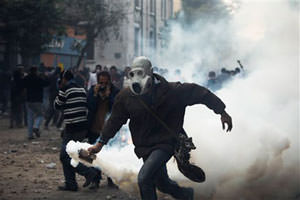
We asked Lauren Unger-Geoffroy, an Arabic-speaking American who lives in Cairo, to share her perspective of life in Egypt after the revolution. In this entry, she writes about the rekindling of violence and revolutionary spirit.
CAIRO — In the surreal dawn of Tahrir Square the sun is purple-gray through the mist of tear gas, a building a block away is burning, the black carcass of an overturned truck smolders as a few people hover. Other people arrive with more blankets and food and bandages.
The dizzying thrill of battle is a heady pheromone that obscures the grief and fear and infuses the masses here with a trembling excitement and pride in their combat against the “oppressor.” The Egyptian people have once again found their value and purpose, which was waning in the last few months of revolutionary inactivity. Some have come to the center of conflict for the first time. Many others here were present in January, February, July, and are back to reclaim the wild exhilaration of being part of an intense unity. … Some do not even agree politically with their comrades of the day, and have come only to help or offer solidarity to fellow Egyptians.
The more violence against the people, the more the people unite, and the more Egyptians will come to help, support and be part of this. The images of outrageous violence have attracted the millions, like moths to flame: All Egypt feels the surge of the collective identity and the pull of the massive wave so strong; people who would never have imagined participating in a demonstration have been swept up in the fervor of the revolution. In the joy of rediscovering a sense of heartfelt brotherhood.
In a repeat of Jan. 25, Christians linked arms to protect praying Muslims from police violence. The action was even more symbolic and moving considering the memories of October’s Maspero Coptic slaughter, still an intense issue and an unhealed wound.
All who are here feel heroic. And they are. The idle young men who are the majority of the demonstrators, who have nothing in their lives that is empowering or as motivating as their participation in the revolution, who found their place and their voice and their pride in January and February, were beginning to lose purpose as life slowly took on the familiar, gray despair of inertia.
Then people began to prepare for the big comeback.
They tweeted “so excited and happy to be going back to Tahrir!” “I miss it so much.”
The message “Back to the revolution!” animated faces and minds again. There was preparation and anticipation. Some even looked forward to righteous conflict. Many imagined violence between secularists and Salafis, etc., but strife among the populace did not happen. The shots and firebombs and toxic tear gas have sent the level of public bonding and motivation to a new level.
Over the last few days we have seen more and more corpses. After the brutal killings of so many at Maspero — scenes of piled bodies, crushed heads, sobbing parents — we are no longer broken and incapacitated by tragic sights. We are able to see bodies in our streets and simply wonder who they were or if there is a heart still beating among them. We are able to watch a video of an officer dragging a body to a mound of garbage.
The field hospitals, the rescuing of the injured, the cooperation and concern of individuals, the generosity, the care, the bonding, makes this battlefield the warmest, most beautiful place to be, a strange scene of heightened pride and massive celebration countering fear and outrage and tragic incomprehension. Songs and the sound of ambulances pierce the rumbling unison of 150,000 people chanting rhythmically, “Freedom! Freedom!”
The first day, Friday, the huge predominance of bearded members of the Muslim Brotherhood and Salafis in the square delivering roars of “Allahu Akbar,” plus literature and some well-thought-out speeches, made some of those in the crowd look a bit dazed, and perhaps uncertain to be shouting out some of the same chants that they used in January to oust Hosni Mubarak.
Some of the few liberals present the first day said “this should not be a religious revolution, this is a popular revolution,” and were ready for tension; however, the Muslim Brotherhood and the Salafis were not there for conflict but to campaign and reject the extraconstitutional rights being claimed by the Supreme Council of the Armed Forces and to urge that presidential elections be held before the proposed July 2013 date. Everyone was together on these demands. In fact, the name given to this demonstration was “Friday of One Demand.”
By Monday night the prime minister and the Cabinet had resigned. This is the second Cabinet that Tahrir Square demonstrations have brought down.
As was the case of the French Revolution, Egypt’s uprising against any successive oppressor will continue … the flowing of blood seems to be a requisite ingredient of true revolution. Many of these injured will have proud scars to show. Many hope to acquire them as badges of courage in the cause of the Egyptian future.
So many of the protesters seem to be boys in their teens.
Ahmed is 17 and says he hopes to die in Tahrir Square. He has written his mother’s telephone number on his arm so she can be reached to identify his body. “It is the greatest thing I can do in this life,” he said as we passed a banner bearing photos and names of martyrs of the revolution.Another, a grown man, Mohamad, told us it was his privilege to be a martyr, that he intended to die for the Egyptian people and it was for the educated ones to build the country.
Tahrir’s main holding station for fatalities said it had run out of coffins.
On Thursday, before all this began, the following was circulating on Facebook and on Twitter (via a hyperlink):
Every Muslim on Friday to bid farewell to his family and leave this message to them:
Do not cry my mother, life is cheap … and patience in the sweet satisfaction of Allah the Merciful Not for us the way of tyrants in the country … rebel against the ways of killing And call the religion of God in our conscience … not to abandon the homeland of the faithful We shall rise and meet in Paradise … like a light shining the most beautiful colors Our weeping sisters want us to make the ungodly pay For all our obedience and crying enough tears over our losses I am free of needs completely Do not cry my mother, life is cheap … and patience in the sweet satisfaction of Allah the Merciful
A boy who seemed about 15 was telling me his 18-year-old brother Mahmoud had been shot dead this week, hit in the chest and neck. He showed me the metal shells in his hand. He had blood all over him. He spoke with pride for his brother, but tears formed in his eyes and he had to wipe them. For the two brothers it had been their first time at a demonstration. The boy excitedly said that he hoped he too could be a martyr, but that now that would be hard for his mother and smaller siblings. Even so, if Allah willed it he would be happy.
I asked, “You are fighting for Egypt? You want to die for Egypt?” remembering how less than a year ago a common sentiment was hating Egypt and wanting to leave. “Yes,” he said fiercely. “I will die for freedom for my country.”
I wonder how much he understands outside the terrible violence of the police, how much he comprehends besides slogans like “The people want the fall of the military government!” He doesn’t know about the elections. He does know the SCAF leaders want to stay and we want them out and they are imprisoning and killing us.
Though the assistant director of military police claims his officers didn’t give the orders to evacuate Tahrir Square and that those who acted violently against the demonstrators did so on their own, it does not matter even if it is true. He tried to explain to the people that the police acting in the square answered to the minister of the interior, but the people don’t care.
At one point tear gas was fired by the security forces into a makeshift field hospital off the central plaza, forcing volunteer doctors and wounded protesters to flee. Nearby mosques and churches opened their doors to the injured. The medical personnel are trying to keep count of the wounded. The police have been aiming at face level instead of shooting low, and there have been a large number of head and facial injuries and fatalities.
One placard reads, “Execute Tantawi, killer of youth, leader of counter revolution.” An effigy of commander-in-chief Mohamed Tantawi hangs from the same Tahrir lamppost that held a Mubarak effigy in January. The enemy is clear. As one protester said, “We want the military council to leave immediately, so we can continue our revolution, and have a civilian government that comes from here, the people’s Tahrir.”
Many liberal and leftist parties have demanded a delay in the elections and have canceled their campaigns. The Islamic parties have suspended electoral activities, if not yet canceling their campaigns.
Any self-declared civilian authority would have to have the support of the Muslim Brotherhood, whose stable and established Freedom and Justice Party’s experienced and well-organized strategy is thought likely to prevail in the elections. Also, the El Nour (“the light”) party, a Salafi organization that covers the nudity of Greek statues and rejected the Muslim Brotherhood-led Democratic Alliance over the inclusion of secular members, is showing a growing following.
The Salafis have taken over a big part of the roundabout and in an unusual turn of events are actually using wood to build a temporary hospital there.
It is 1 a.m. Monday. Tahrir Square is full, proud and confident … but the streets of Cairo were otherwise very empty tonight. The people are either at Tahrir or inside their homes.
As usual, in every automobile Egypt state radio was telling people that foreigners were behind the events, but only the most hopelessly gullible believed that. Inshalla, we will not have the usual spy-hunt period of propaganda during “disturbances.”
In fact, since the Maspero disaster there has been a subtle change in the tone of national media, whose propaganda against the revolution had dirtied them beyond forgiveness in the eyes of many. Things are slightly different now that a Nile News reporting team has been shot at in Tahrir Square by the police of the Central Security Forces.Concessions have begun. The junta is attempting to appease the protesters and stem the violence by offering concessions — including imposing a long-awaited “treachery law” barring former members of Mubarak’s now-disbanded ruling party from running in the parliamentary elections, which are now less than a week away if they take place. But these actions are too little, too late for the people, who are ready for war. This news appeared only to galvanize resistance, as did the later announcement of Prime Minister Essam Sharaf’s proposed resignation.
Egypt’s youths are determined and geared up for the good war. They can be heroes and warriors, they are ready to sacrifice, ready for martyrdom and burned and torn flesh, they will go to a field hospital and then straight back to the struggle. A friend of mine says, “They used to dream of cars, houses and leaving the country; now they dream of standing in Tahrir.” The vast majority of the victims of anti-revolutionary violence have been between 19 and 27 years old.
The silent majority is not sure, but it consists of good and generous people, and the shocking videos of the protesters beaten and killed in Tahrir earned huge sympathy. Many people are sending medical supplies, and several pharmacies are providing discounts and free delivery to Tahrir field hospitals. Hundreds are sending camping blankets, food and drink.
There are protests in 14 cities in Egypt now, including Ismailia on the Suez Canal and the strategically important town of al-Arish in the northern Sinai Peninsula. In Egypt’s second-largest city, the Mediterranean port of Alexandria, thousands are in the streets crying “God is great! There is no god but God!” Injuries and deaths are occurring in many places.
I must travel to the United States, and I hate to leave even for a week. I hate to leave this country burning.
I am afraid to leave my people, who would help me as I would help them in any need.
I also am afraid that if I fall sick in the U.S. — perhaps from having breathed military-grade tear gas — how will I be able to get medical help? I have no insurance. I can’t afford to go to an American hospital. If I fell down, would people rush to carry me to get care?
As we huddled around some burning garbage Monday night to keep warm, a man and woman came and doled out plastic cups of delicious lentil soup and rough brown circles of Balady bread covered with ashes. Two of the young men standing with us seemed younger than the 19 and 21 years they claimed. They were talking about how Allah loves martyrs and they will die here. I pray they will be disappointed and the blood will stop.
I should note that all the ATMs are intact and not a single shop has been looted in downtown Cairo despite the hundreds of thousands of poor people running through the streets with no police presence. This is Egypt.
Your support matters…Independent journalism is under threat and overshadowed by heavily funded mainstream media.
You can help level the playing field. Become a member.
Your tax-deductible contribution keeps us digging beneath the headlines to give you thought-provoking, investigative reporting and analysis that unearths what's really happening- without compromise.
Give today to support our courageous, independent journalists.

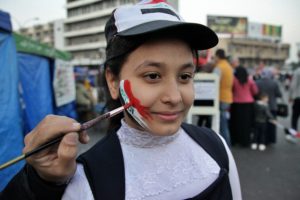
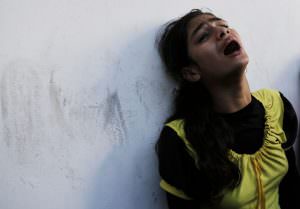
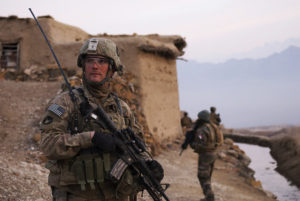
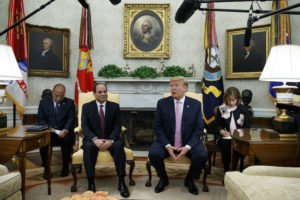

You need to be a supporter to comment.
There are currently no responses to this article.
Be the first to respond.